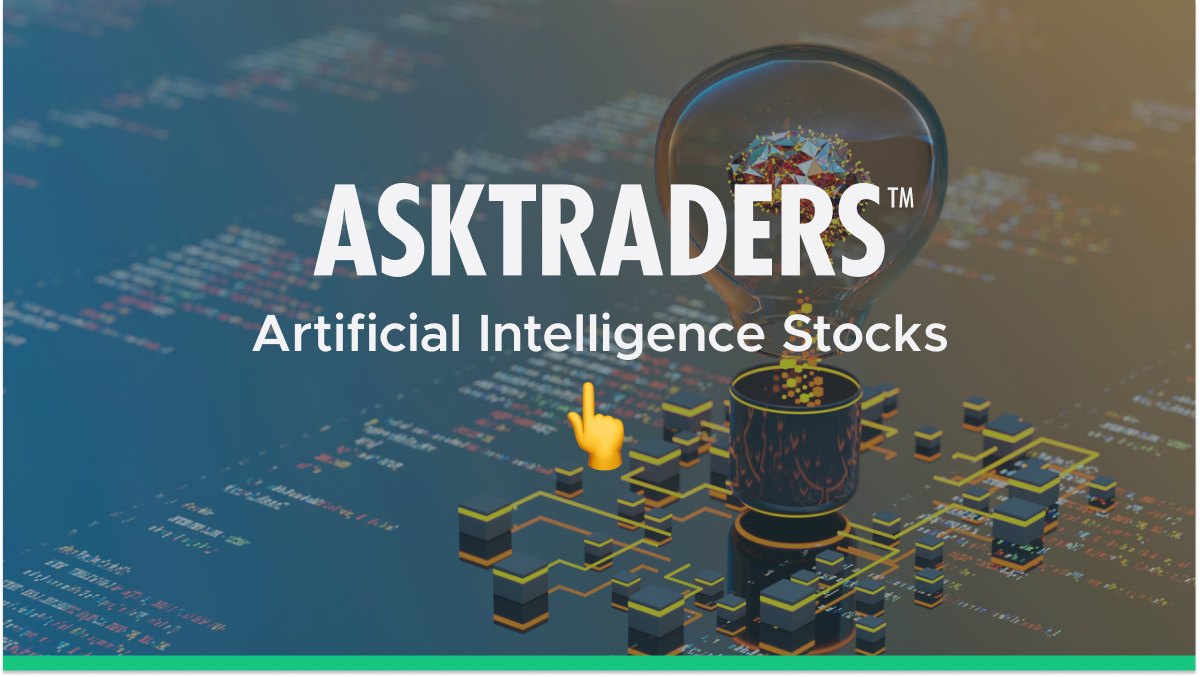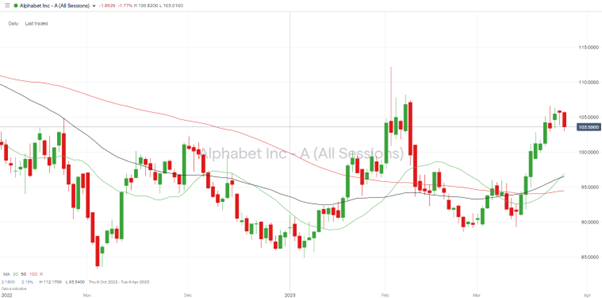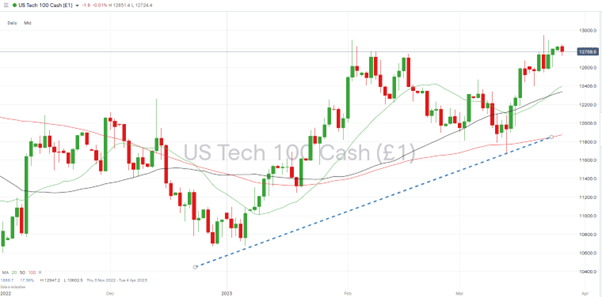The potential which AI firms have to disrupt current practises is causing some investors to have flashbacks to the emergences of Microsoft (MSFT), Apple (AAPL), and Zoom (ZM). Some of the early investors in those firms have made life-changing sums of money. The same could be said of those willing to invest in Artificial Intelligence Stocks.
YOUR CAPITAL IS AT RISK

Any sector with a predicted annual growth rate of nearly 40% is bound to catch the eye of investors, but working out how to pick the winners is crucial. Any new market also has a considerable amount of adjustment before valuations begin to settle down. Here are some things to consider.
Table of contents
Why Invest in AI Stocks?
Virtually every industry is already being disrupted by artificial intelligence, machine learning, automation, and robotics. But what is AI investing, and what does it entail?
AI utilises computer processing power in a different way. Computers have established a position as the ‘go-to’ device for working out complex calculations or storing data, but AI allows computers to perform tasks where humans have traditionally had an advantage. This includes such things as visual perception, reasoning, and language processing.
This all means that activities currently carried out by humans could be carried out by computers and robots, leading to potential cost savings and new markets being developed.
Scalability
AI firms currently developing tools and services for other companies would benefit from ‘scalability’. This means that, for every unit of the product they sell, the additional costs of generating it will be minimal.
Scalability is the reason that stocks in tech giants such as Microsoft have performed so well. The marginal cost to the firm of issuing another license for Microsoft Office software is small. Extra revenue then feeds through to the bottom line as a healthy profit. This explains how an investor who bought $1,000 of MSFT stock in 1986 would now have a position worth $3.23m.
Long-term gains
Investments in AI stocks could be something suited to investors with a long-term investment horizon. AI technology is transformative and disruptive in nature, meaning that some of the benefits may take time to be converted into hard cash. Nothing is guaranteed in the markets, but a diversified portfolio of Artificial Intelligence Stocks could contain stocks which may go on to post eye-watering returns.
Undervalued
Driverless cars, personalised shopping, fraud prevention, and voice assistants, are just some of the activities where AI may provide a significant tech upgrade. The reality is that it’s still hard to establish the full extent to which AI could change the way things are done. This means that some stocks with AI potential will currently be overlooked by investors, making them a great sector for those looking to buy undervalued stocks.
The potential for long-term gains does not mean that investors should hold off in investing for now. The global artificial intelligence (AI) market size was estimated to be $119.7bn in 2022 but is expected to hit $1,591bn by 2030. This growth prediction represents a compound annual growth rate (CAGR) of 38.1%.
Identifying Promising Artificial Intelligence Stocks
For some, their most direct interaction to date with AI will have been to use chatbots such as OpenAI’s ChatGPT interface. These chatbots were popularised as it was discovered that they could generate entire essays, assisting students who would only need to enter the title of the task set for them.
While ChatGPT is making the headlines because of the way it can complete homework for students at the click of a button, a myriad of other projects is being worked on. The trick is establishing the extent to which those ideas can be converted into a business opportunity.
Technological advantage
One obvious way to filter Artificial Intelligence Stocks is to look for firms that use artificial intelligence technology to improve products or to gain a strategic edge. This involves keeping up to date with company announcements and research notes to find firms such as NVIDIA Corp (NVDA) which has a pipeline of innovative new products, and is considered to be market leader in deep learning. The DeepPharma platform developed by the company has shown impressive results in using voice and image recognition to treat cancer and aging.
Natural progression
Some sectors will be impacted by AI at different times, according to how the technology develops. If AI is already bringing in innovative ways to revolutionise current practices, then the potential for stock price returns in tech, transport, and online marketing might already be priced in. An alternative approach is to stay ahead of the curve and identify the sector where AI technology will next make a huge impact.
Support services
Other companies will also profit directly from AI by selling hardware and software, services, or expertise that the technology needs. This ties in with the old adage that during a gold rush, the best business idea is to sell picks and shovels, rather than prospect for the metal.
Traditional industries
The influence of AI on share prices extends beyond the companies developing the technology. Firms that aren’t necessarily outright Artificial Intelligence Stocks can still manage to capitalise on the efficiency savings that AI offers. For example, if BP (BP) rather than Shell (SHEL) establishes an advantage as an adopter of AI technology, then that firm could gain market share and, in turn, outperform its rival.
YOUR CAPITAL IS AT RISK
Risks and Considerations
The forecast rate of adoption of AI technologies doesn’t equate to all the stocks in the sector performing equally well; there will be winners and losers. At a higher level, high-growth and technology sub-sectors are exposed to specific kinds or risks, meaning that there are also potential headwinds facing the AI industry as a whole.
Regulation
The paradox surrounding AI sector investments is that some of the upheavals the technology promises, and could be so profitable for investors, is on such a scale that there could be significant resistance to them being adopted.
Social media platform TikTok isn’t an AI stock, but the political furore surrounding it offers an indication of how tech adoption is becoming a large issue. In the case of TikTok, the firm’s management have been called before the US Senate Intelligence Committee.
The prospect of autonomous vehicles taking the jobs of millions of US delivery drivers drew this response from influential political commentator Tucker Carlson:
“Driving for a living is the single most common job for high-school educated men in this country [US]… the social cost of eliminating their jobs in a 10-year span, 5-year span, 30-year span, is so high that it’s not sustainable”.
Source: YouTube
There is a risk that AI firms could easily get caught up in the crossfire of what is increasingly looking like a global tech ‘turf war’.
Competitors
Firms with great AI products need to ensure that they release them to the market at the optimal time. This should be done in order to capture market share, and to have barriers of entry to hold back the progress of their rivals. The launch of Microsoft-backed OpenAI’s ChatGPT product in November 2022 represented such a threat to Google’s $149bn search engine business that Google founders reportedly demanded their team to bring forward the launch of 20 AI products.
In a matter of months, ChatGPT grew from being a curiosity into a product – one which has the potential to disrupt one of the biggest and most important markets in the world. Those concerns have directly impacted investors. Between November 2022 and March 2023, the value of Google’s parent company Alphabet (GOOG) fell by 7.64%, while the Nasdaq 100 index increased in value by 4.97% over the same period of time.


Phoney AI
The buzz around AI stocks does require investors to be on guard from companies that falsely tout themselves as plays on AI technology. A decision to buy AI stocks should be based on research and due diligence. Analysis should establish a company that has some kind of plausible ‘edge’, rather than just a neat PR operation and a sky-rocketing share price.
Price Volatility
The prices of some AI stocks, particularly those of small companies with one potentially innovative product, face a largely binary outcome. These companies will either be the next big thing, or they will not. The share prices in firms facing these sorts of outcomes notoriously volatile. Investor sentiment can switch in an instant, and that can make it difficult to hold onto market positions.
For this reason, investors in AI stocks need to ensure that their strategy factors in their individual risk tolerance, so that the chosen AI stocks are a good fit for their approach.
Diversification
One way to manage the risks mentioned is to use diversification, an approach which applies to all forms of investing but also specifically to AI stocks. By allocating capital to a range of AI stocks, rather than concentrating your interests in one, it’s possible to mitigate against single-stock risk, cast a wider net over potential breakout stocks, and smooth out investment returns.
The Lyxor MSCI Robotics & AI UCITS ETF is an ETF (exchange traded fund) is a fund for AI investors to consider. It invests in 148 companies that are expected to derive significant revenue from areas like AI, robotics, internet of things, smart homes, cybersecurity, medical robotics vehicle automation and social media automation.
Psychology of investing
Fear of missing out, FOMO, can lead to investors making decisions that are based on negative emotions, and the simple fact that the price of an asset is increasing, rather than comprehensive analysis. Adopting a more sensible investment approach can help to establish which Artificial Intelligence Stocks are the best to buy, and also nullifies another risk of inertia.
Despite all the mentioned challenges facing the sector, one very real risk is that an investor’s portfolio is not rebalanced to capture some of the potential of AI. Not only would they miss out on profitable returns, but some legacy firms could see their value greatly impacted by the changes AI presents. Shareholders of Kodak, Blackberry, Blockbuster, and Myspace can testify how once-good investments turn sour when a firm’s management does not embrace change.
YOUR CAPITAL IS AT RISK
Summary
Countless AI companies could potentially become household names in the very near future and could dominate a growth sector which is set to become a cornerstone of future economic activity. When that happens, the investors who spotted the opportunity early on can make substantial returns.
The threats facing the AI sector cannot be ignored, and they go on top of the risk that a company doesn’t do a good job of running its day-to-day operations. Even then, those which do implement a high-quality strategy could find external factors overwhelm them which makes spreading capital across different stocks the best move for any AI investors.













